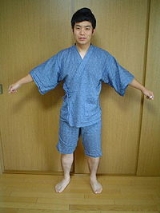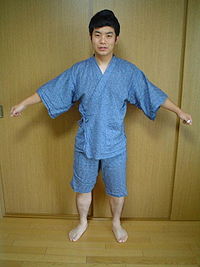
Jinbei
Encyclopedia

Japan
Japan is an island nation in East Asia. Located in the Pacific Ocean, it lies to the east of the Sea of Japan, China, North Korea, South Korea and Russia, stretching from the Sea of Okhotsk in the north to the East China Sea and Taiwan in the south...
ese clothing worn by men, women, boys, girls, and even babies during the summer. Women's jinbei have started to become popular in recent years.
Use
Jinbei are usually worn as a form of nightwear or house wear. Normally, male Japanese would wear jinbei only within their own homes, or outside the home when in close proximity to it (for example, to collect the mail or go on a local errand, or sometimes even while shopping or dining at a local restaurant). Sometimes jinbei are used as substitute for yukataYukata
A is a Japanese garment, a casual summer kimono usually made of cotton. People wearing yukata are a common sight in Japan at fireworks displays, bon-odori festivals, and other summer events. The yukata is also frequently worn after bathing at traditional Japanese inns...
during a summer festival, typically by men and boys but also frequently by young women. Ladies' jinbei tend to be more brightly coloured and often feature prints of popular culture characters and motifs.
The whale shark
Whale shark
The whale shark, Rhincodon typus, is a slow-moving filter feeding shark, the largest extant fish species. The largest confirmed individual had a length of and a weight of more than , but unconfirmed claims report considerably larger whale sharks...
is also known as in Japanese language due to its skin patterns resembling those of jinbei robes.
Set
Jinbei sets consist of a top and matching shorts, although some have long pants and some come with both short and long pants. Traditional jinbei are made from hempHemp
Hemp is mostly used as a name for low tetrahydrocannabinol strains of the plant Cannabis sativa, of fiber and/or oilseed varieties. In modern times, hemp has been used for industrial purposes including paper, textiles, biodegradable plastics, construction, health food and fuel with modest...
or cotton
Cotton
Cotton is a soft, fluffy staple fiber that grows in a boll, or protective capsule, around the seeds of cotton plants of the genus Gossypium. The fiber is almost pure cellulose. The botanical purpose of cotton fiber is to aid in seed dispersal....
and are dyed a uniform color, often indigo, blue or green (though modern jinbei frequently have prints ranging from simple textures or lines to complicated and colorful floral patterns). The top resembles a short-sleeved or sleeveless jacket that falls to the hips. It ties closed both inside and outside the jacket, with the inside tied first, the jacket folded over to the person's left, and then tying the outside.
The seam for jinbei is very loosely woven to allow for ventilation during hot weather while retaining coverage.

